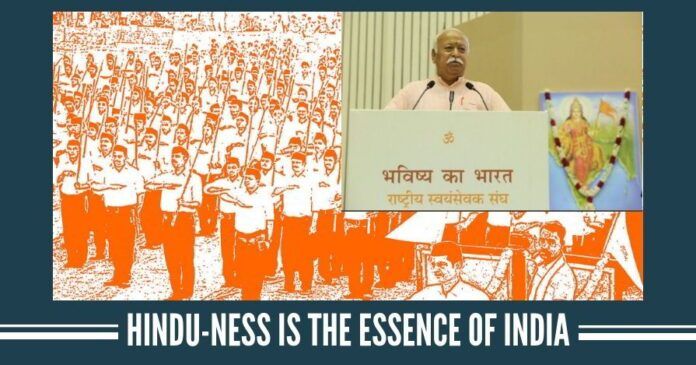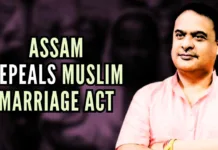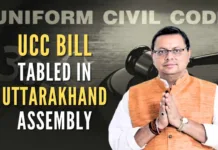
With the very first question seeking clarity on the equation between Hindutva and Hinduism, the stage was set for a never before public enunciation of RSS views
On a day when the Union Government coincidentally passed an ordinance criminalizing the practice of triple talaq (talaq-e-biddat), providing relief to thousands of Muslim women living in fear of instant talaq and homelessness, and inching the country towards greater equality in civil laws, the Rashtriya Swayamsevak Sangh (RSS) Sarsanghachalak Mohan Bhagwat said he favored a debate on the issue of a uniform civil code (UCC).
To thundering applause and thumbing of tables, Bhagwat said that in his personal opinion, “a grand mandir for Shri Ram should be built at the Ramjanmabhoomi in Ayodhya as soon as possible.
Taking a range of heavy-duty questions on virtually every burning issue head-on at the conclusion of a three-day conclave, “Future of Bharat: An RSS Vision” in New Delhi, he pointed out that the Constitution of India mentioned a uniform civil code as desirable, and hence it should be deliberated upon. Bhagwat added that such a code would involve changes in the personal laws of all communities, including Hindus, and should not create differences within communities. This was a gentle hint to minority groups that fear that the government may hasten in towards a UCC, though Bhagwat shrewdly pointed out that minority does not mean only Muslims, and would involve all groups within the country.
With the very first question seeking clarity on the equation between Hindutva and Hinduism, the stage was set for a never before public enunciation of RSS views on almost every burning contemporary issue. Anything left out was probably not asked, because the organizers did not seem shy of listing any question.
The Sarsanghachalak began by explaining that the term ‘Hinduism’ is incorrect because it signifies a closed concept, which Hindu dharma is not. Hindutva, he said, is Hindu-ness, the essence of what it means to be Hindu. Mahatma Gandhi called Hindutva the ‘endless search for truth’, and Sarvapalli Radhakrishnan called it a ‘continuous process’. Hence, it is not to be confused with religion with its codes, and dos and don’ts, but should be understood as a value system that teaches unity, sacrifice, cooperation, self-restraint, and love. Above all, it is a quest for the truth of existence, understanding the diversities of the world. Hindutva is a value system, a process of being, and can be equally captured with terms such as Indic thought, Bharatiyata, and so on.
As an organization based on such a philosophy, the RSS believes in taking everyone along regardless of religion or race, if that group accepts India as motherland. Hindutva is by definition inclusive. Indeed, Hindu dharma speaks for the oneness of humanity (Vasudhaiva Kutumbakam) and provides space for everyone. There is no narrowness in the vision of the rishis who created this great civilization.
It follows that Hindu Rashtra (nation) is different from Hindu Rajya (state); it does not envision the exclusion of Muslims or any other group. Our culture, he stressed, “does not say that we tolerate any religion. We accept other religions as true”. Answering another question, the RSS chief said the organization agrees with the Supreme Court that homosexuality is not a crime and that the LGBTQ community is a part of society and should not be made to feel isolated.
Bhagwat was astonished when one questioner asked why the Sikh tradition was excluded from the RSS worldview, and said that from Guru Nanak to Guru Gobind Singh, all Sikh gurus were respected by the RSS in their daily morning prayers, as were the Jaina and Baudha traditions. Hindu Rashtra, he emphasized, does not rest on segregation or rejection of any community or faith; “that is not Hindutva”. All groups that abide by the sense of one nation and its core values are part and parcel of the Rashtra.
Debunking the charge that RSS did not respect the Constitution or Flag of India, Mohan ji read out the Preamble, saying that while the words ‘secular and socialist’ were added later, the RSS accepted them as part of the constitution. The organization’s saffron flag, however, precedes independence (RSS was founded in 1925), and that is why the organization reveres the saffron flag as Guru; its annual funds are collected as Guru Dakshina (dues to the mentor) under the flag. Interestingly, he revealed that while the RSS is not a registered body under the law, it is recognized as a legal entity; it is not required to pay taxes, but all accounts are scrupulously audited by external auditors every year and can be furnished to the government, if and when required. As per the RSS Constitution, elections are held every three years regularly for all posts barring that of Sarsanghachalak, but added that his office is that of a guide and does not have organizational powers.
To thundering applause and thumbing of tables, Bhagwat said that in his personal opinion, “a grand mandir for Shri Ram should be built at the Ramjanmabhoomi in Ayodhya as soon as possible. Many communities across religions look up to Shri Ram as their ideal. He has been called Imam-e-Hind. It is only right that a grand temple should be built at the place Bhagwan Ram was born”. Ideally, this should be done amicably and by consensus; he avoided alluding to the case in the Supreme Court.
Hindu traditions, he pointed out, have always evolved according to the times and we should be ready to change systems that are harming the environment.
On cow vigilantism, Bhagwat insisted that anti-social vigilantes cannot be equated with cow protectors. Taking the law in one’s own hand, indulging in violence and destroying property in the name of the cow is totally inappropriate; there must be respect for the due process of law. The guilty should be punished. The cow is sacred in our tradition and was once the basis of the rural ecosystem and small farmers. Today people know the value of cow milk, A2 milk, so the cow can be protected by making society aware of its values. Cow protection is a societal need, but it cannot happen only through law. People should keep cows properly; if they are allowed to roam free, it creates a menace and reduces the sanctity of the cow.
On the contentious subject of reservations, Mohan ji said, “We support reservation as the Constitution of India provides for it. Reservation should stay till those communities who get the benefits of reservation themselves decide that they no longer need it”. Reservations were provided to correct the inequalities that crept into Hindu society over past centuries, so even if the rest of us have to wait for a century for the situation to correct itself, we should be patient because “reservation is not the problem, it is the politics of reservation that creates problems.” Further, he added that the government should implement the SC/ST Act to protect the groups against atrocities, but also ensure that the law is not misused against anyone.
On the related issue of the caste system and inter-caste marriages, Bhagwat said, “the Sangh supports inter-caste marriages, which should become a process for promoting homogeneity in the society”, but it cannot be artificially imposed as the harmony of the individuals involved has to be paramount. Interestingly, he added that if ever there was a census of inter-caste marriages, the highest percentage would be of Swayamsevaks across the country. The caste system, he said, “won’t go if one shouts at it. One has to light a lamp to dispel the darkness.”
Bhagwat did not shy from speaking his mind on the issue of conversions, which have currently begun to agitate the mind of Hindus across the country. If it is true that all religions are the same, he queried, “What is the need for conversion?” Rather, those who promote conversion are not promoting spirituality; they have sinister motives. Personal beliefs should be a matter of individual prerogative. “Religion cannot be sold in the market”, he said, citing the case of a man much respected in the Sangh, who converted out of his own convictions, while his family remained Hindu. Such instances are rare, however, and “all of us know how conversions are done. If money exchanges hands to force conversions, we will speak against it.”
Questioned about India’s demographic balance, Bhagwat said he favored a comprehensive and balanced policy on population. Policy-makers must envision the population bulge over the next 50 years and plan accordingly, and once the policy is made, it should be applicable to all communities. Indeed, he added, “wherever the situation is more complicated, it should be implemented on a priority basis.”
Mohan ji mildly conceded that Hindu festivals appeared to be the target of the pollution control industry. While environment and pollution are important national issues and every community must act responsibly during its festivals, he felt this should apply across all communities. Hindu traditions, he pointed out, have always evolved according to the times and we should be ready to change systems that are harming the environment. The original Diwali crackers, he observed, were made with home-made materials that helped to control the excess mosquito population after the monsoons; modern-day crackers, by contrast, are pollutants.
On the political question of NOTA in elections, Bhagwat said that in a democracy, it is not possible to get a 100% perfect option and so the best available option has to be chosen.
Regarding the role of women in society, he said, women and men complement each other and should cooperate in building the nation as equal partners. Women have to be made capable of taking care of themselves, while young boys have to be given our traditional ‘sankaras’. Our value system taught us that other than our own wife, every woman must be seen as a mother; with those values, there can never be a crime. In an indirect allusion to the state of Gujarat, he said that even today there are states in India where women can move alone, wearing jewelry, without any danger.
On the persisting controversy over language, Bhagwat upheld the value of imparting education in the mother tongue and respecting and preserving all Indian languages. There is no need for enmity towards any language and even foreign languages should be learnt. But while Hindi is learnt and accepted in large parts of the country, people from Hindi-speaking regions should consider learning another Indian language, especially if they live in other states. Further, education should empower children to be what they want to be; parents must understand that everyone is not going to become an architect, engineer or doctor and that each child must realize his/her own potential. Modern education must also impart our traditional knowledge and values of life.
On the political question of NOTA (none of the above) in elections, Bhagwat said that in a democracy, it is not possible to get a 100 percent perfect option and so the best available option has to be chosen. In fact, even during the Mahabharata era, the Yadavs were divided on the question of supporting the Kauravas or the Pandavas, as the latter too, had made serious mistakes by offering their wife in a game of dice. At this point, Sri Krishna intervened and said that human perfection is not possible and hence the best available option should be selected. Asserting that this holds true even today, Bhagwat cautioned against opting for the NOTA button because, “if we don’t select the best available option, the worst available option will benefit.”
The purpose of the three-day public interaction was to explain to interested persons that the sole objective and purpose of the RSS was to train people to be responsible citizens of the country. To that end, the organization’s sole activity is to conduct shakas, while Swayamsevaks take up various social and national projects of their own volition, and create myriad trusts and organizations to do so. This ‘vyakti–nirman’ (character-building) has enabled the RSS to expand across the length and breadth of India as its quality of being the first to react in any national disaster has spread its influence and reputation, despite constant vilification by vested political interests.
Note:
1. The views expressed here are those of the author and do not necessarily represent or reflect the views of PGurus.
- Plagiarism with Pride - November 10, 2018
- “Hindu-ness is the essence of India” – RSS Sarsanghachalak - September 20, 2018
- Lacunas persist in Kathua story - May 5, 2018











MIS GUIDED INDIAN GOVT AND WRITERS OF THE NATION NEED TO LOOK AFTER ALL LOCAL CONVERTS POOR AND UNEDUCATED SOULS FOOLED BY INVADERS TO ISLAM AND CRISTIAN NEED FEEDOM FROM THAT BONDAGE .
SPECIAL MINISTRY NEEDED TO HELP THESE CONVERTS TO RECONVERT INTO THEIR OWN HERITAGE AND CULTURE OF ANCESTORS. INDIAN GOV FAILED 100% UNDER CONGRESS TO HELP THESE MILLIONS CONVERTS LIVING IN INDIA AND SUFFERING MENTAL SLAVERY .
THIS GOVT SHOULD ALLOCATE 1000 CRORES TO HELP THESE CONVERTS TO GET BACK TO THEIR HERITAGE .
While these are reportedly the views of Sri Mohan Bhagwat as the RSS Sarsanghchalak and are accepted as such, some of them should be considered totally unacceptable in any modern society, especially a democratic one. The first one is of course on UCC. One society, one law is of course a sine qua non. In fact in a society touted to have rule of law, even the CPC and CrPC needs to be merged into IPC, because all crimes should be considered crimes against the society. The next one is on reservations. There cannot be nothing more unfair that rewarding incompetence, for whatever reasons. Of course proactive help to overcome the effect of having been in the backyards of the society needs to be pursued but that has to be through building competence in the individuals. Reservation is certainly anathema to progress. We have the quip: if you give a man a fish you give him food for the moment but if you teach him to fish you give him food for a life time! And equally important is the need to infuse the dignity of labour. If everybody were to be the CEO then who will do the assembly line work?
On the matter of conversions it is not legally possible to prevent it as anyone, even if he does it to get money or other benefits, (which happens very often), can invoke his right to freedom of belief and lifestyle. Even a dictatorship cannot control people’s private lives, not to speak of a democracy. In ancient India and also today people choose their ista-devata, guru and personal religious practives within the wider Indic fold. The problem is with the very concept of conversion which is a semitic notion rooted in an interpretation of the Bible that separates the ‘chosen’ people from the sinful, benighted ones who are seen as goyim (beasts) in Jewish tradition and as pagans, idolaters or polytheists by Christians and Muslims, Without that legal and ritual discrimination, conversion would not be a problem as it would be a matter of personal taste and affinity.
That is clear thinking. Conversion is an economic issue alone (assume). In that case, the converted should go back to religious freedom and demand one more payment for continued converted status and so on and so on. That doesn’t happen. That means there is an issue of coercion. Both RSS and BJP have failed to address this.
Over last few months, this website alone has raised some important questions. I don’t see any of that here. I am totally disappointed.
Nice.